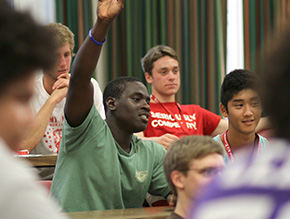Wabash College has received an $800,000 grant from The Andrew W. Mellon Foundation for the implementation of the Wabash Liberal Arts Immersion Program (WLAIP).
Part of the three-year grant will support a four-week, summer program on campus aimed at improving the retention and graduation rates at Wabash College. The program, designed for 30 students, will build written communication and organizational skills, expose students to the benefits of a liberal arts degree, and connect them to the many campus support systems in place to help them succeed.
“We are very excited about this new program and the benefits it will provide for Wabash students and their families,” said Wabash President Gregory Hess. “We are grateful to The Andrew W. Mellon Foundation for its belief and investment in Wabash College and the important work we are doing to educate young men in the liberal arts. We know that the key elements of this program will pay dividends for our students, and will provide a model for other colleges and universities and their efforts to retain and graduate students of all socio-economic means.”
Directed by Wabash faculty, the summer program features programming for both students and parents that includes exposure to the liberal arts, a summer immersion experience, and opportunities and resources that are focused on increasing student success. All program expenses will be covered for the participants. Students will also receive a stipend to offset wages potentially earned through summer employment.
 “The low graduation rates of young men, especially young men who are first generation college students or students of color, is a growing concern in higher education,” said Dean of the College Scott Feller. “We are excited about the opportunity to work intensely with a group of students who are beginning the critically important transition to college.”
“The low graduation rates of young men, especially young men who are first generation college students or students of color, is a growing concern in higher education,” said Dean of the College Scott Feller. “We are excited about the opportunity to work intensely with a group of students who are beginning the critically important transition to college.”
The academic centerpiece will be a for-credit English composition course. The course will improve writing and comprehensive reading skills and introduce students to the academic rigors of college. The program will also expand students’ understanding of the liberal arts and the vast number of career opportunities within a variety of majors.
Alumni visits, video conferences, and off-campus site visits will further connect students to career opportunities. WLAIP will culminate with an immersion experience during the summer prior to the students’ sophomore year, which could include paid summer research, business or community organization internships, participation in Wabash’s seven-week Liberal Arts Bridges to Business program, or academic immersion learning courses.
Students will be connected early to the faculty on campus as well as the academic support network such as the Writing Center, the Qualitative Skills Center, the Student Health Center, and the Counseling Center. In addition, upperclassmen tutors and peer mentors, many who arrived with similar backgrounds and have found success in their careers at Wabash, will introduce the WLAIP freshmen to topics like time management and study skills.
“This program will give students an invaluable head-start on understanding the expectations and opportunities that come with a Wabash education,” said Psychology Professor and Director of WLAIP Robert Horton. “It will get them thinking early about what they might do after Wabash. Overall, we believe that students will be more successful and satisfied with their College experience if we show them what a Wabash education is, where that education can take them, and who can help them get there.”
Uniquely, the summer program includes two days of programming for parents as well, featuring special sessions with Wabash faculty and staff in conversations about the value of a liberal arts education, off-campus study, the financial demands of college attendance, counseling, support, and the transition to college.
The grant also allows Wabash to develop and enhance a range of activities focusing on the freshman year experience by equipping faculty and staff with skills to work with students who are struggling with the transition to college and by furthering work in cultural awareness and competency.
The Dean of the College will extend special invitations to students in late spring. The inaugural four-week summer program will begin in July.